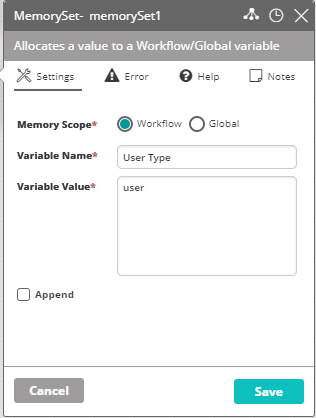Advanced Communicate
Activity Description
Advanced Communicate Activity is used to assign a person to handle the event or the Incident that triggered the Workflow. It contacts all the recipients in the list, one by one, until one of them takes responsibility for the Incident that triggered the Workflow and is assigned to handle it. The person who takes responsibility for the Incident is displayed in the NG Dashboard under the Incident. Advanced Communicate Activity is similar to Communicate Activity, only each setting parameter of the Activity may also be a Variable.
Output
%communicate.username%: the name of the user who took responsibility for the Incident.%communicate.userfullname%: the full name of the user who took responsibility for the incident.
Settings
- Single message – determines whether all recipients get the same message or each of them is contacted with an individually defined message.
- Notify all recipients upon assignment – notifies all recipients that had already been contacted (including the one assigned to the Incident) upon user assignment.
- Message Type – the type of message sent to the recipient:
- Original – the message that triggered the Workflow.
- Custom – any entered free text.
- Template – a predefined message.
- Template name – the selected message template.
:::note Message templates are created via Resolve Actions Express General Repository. For additional information on message templates, refer to the Message Templates. ::: - User Type: Group/User – determines whether to contact a specific User, a Group of Users or a variable type.
:::note If no Group was created in Actions Express, the "Group" option, correspondingly, will not be available from this table. ::: :::note To use a variable that represents the type of contact (Group/User) use the following convention:%Type%(e.g.,%UserType%). In this case the value is derived from a variable set in Memory Set Activity, as depicted in the following image: :::
::: - Name/Variable Name – the name of the User/Group or the name of the variable representing one of the options (e.g.,
%UserType%). - Comm. Method: email/SMS – the mean of communication by which the recipient is contacted.
:::note To use a variable that represents the communication method use the following convention:%Type%(e.g.,%email%). ::: - Reply Time – the time frame in which the current recipient may respond and after which escalation is performed and the next recipient is contacted to handle the Incident.
:::note To use a variable that represents the Reply Time value use the following convention:%Type%(e.g.,%replyTime%). :::
Advanced Options
- Time Frame – the time in the day in which the selected recipient may be contacted.
:::note Time frames are defined via Actions Express General Repository. For additional information on Time Frames, refer to Time Frames. ::: :::note To use a variable that represents the time frame use the following convention:%Type%(e.g.,%timeframe%). ::: - Show Assignment – Determines whether to display the currently contacted recipient under the Assign column in Resolve Actions Express Dashboard.
:::note For additional information on Resolve Actions Express Dashboard, refer to Understanding Actions Express Live. ::: - Group one by one – when a Group is selected, determines whether all Users in the Group are contacted simultaneously or they are contacted one by one until one of them is assigned to handle the Incident. The timeout defined will determine the time passing between one contact attempt and another.
- Recovery notification – adds the selected recipient to the recovery list. When the Incident is recovered, the recipients in the recovery list are notified.
Edit Message
note
When Single message for all is not selected, an individual message should be set for each and every recipient, else this should be edited only once.
- Method – the type of message sent to the recipient:
- Original – the message that triggered the workflow.
- Custom – any entered free text.
- Template – a predefined message.
- Template Name – the selected message template
:::note Message templates are created via Actions Express General Repository. For additional information on message templates, refer to the Message Templates. :::